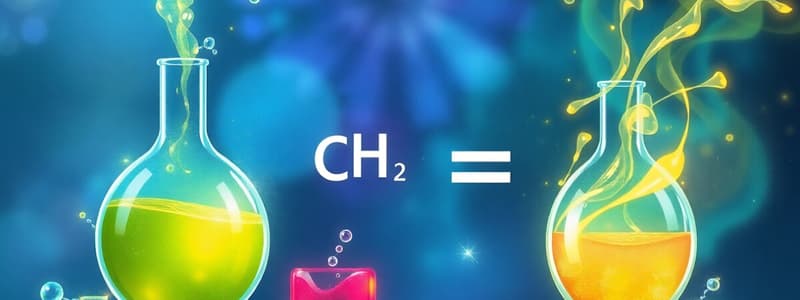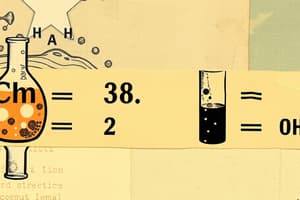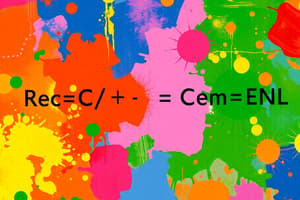Podcast
Questions and Answers
What are reactants in a chemical word equation?
What are reactants in a chemical word equation?
- Substances that undergo a chemical change (correct)
- Substances that are formed as a result of the reaction
- Substances that do not undergo any changes
- The direction of the chemical reaction
What does the arrow (→) in a chemical word equation indicate?
What does the arrow (→) in a chemical word equation indicate?
- The reactants are combined
- The products are produced
- The direction of the reaction (correct)
- The amount of energy released
Which of the following represents a complete chemical word equation?
Which of the following represents a complete chemical word equation?
- Hydrogen + Oxygen + Energy → Water
- Methane + Oxygen → Carbon Dioxide + Water (correct)
- Methane + Oxygen → Carbon Dioxide
- Hydrogen + Oxygen → Water + Heat
In a chemical reaction, what happens to the atoms involved?
In a chemical reaction, what happens to the atoms involved?
What is the importance of balancing a chemical word equation?
What is the importance of balancing a chemical word equation?
Which of the following is NOT a component of a chemical word equation?
Which of the following is NOT a component of a chemical word equation?
How is energy often affected during chemical reactions?
How is energy often affected during chemical reactions?
What is formed when hydrogen gas reacts with oxygen gas?
What is formed when hydrogen gas reacts with oxygen gas?
Which of these equations correctly shows the transformation of reactants into products?
Which of these equations correctly shows the transformation of reactants into products?
Why is it beneficial to use chemical word equations for beginners?
Why is it beneficial to use chemical word equations for beginners?
What is produced when methane burns in the presence of oxygen?
What is produced when methane burns in the presence of oxygen?
Which reaction type involves sodium reacting with water?
Which reaction type involves sodium reacting with water?
What is the product formed from the neutralization of hydrochloric acid by sodium hydroxide?
What is the product formed from the neutralization of hydrochloric acid by sodium hydroxide?
What does the arrow in a chemical word equation represent?
What does the arrow in a chemical word equation represent?
Which of these is produced during the decomposition of calcium carbonate?
Which of these is produced during the decomposition of calcium carbonate?
Which of the following chemical equations illustrates a synthesis reaction?
Which of the following chemical equations illustrates a synthesis reaction?
Which statement about chemical word equations is correct?
Which statement about chemical word equations is correct?
What happens to iron when it reacts with oxygen and water?
What happens to iron when it reacts with oxygen and water?
In the context of writing word equations, what should you do first?
In the context of writing word equations, what should you do first?
What is the end product of a neutralization reaction?
What is the end product of a neutralization reaction?
Flashcards are hidden until you start studying
Study Notes
Chemical Word Equations
- Represent chemical reactions using names of substances involved
- Help beginners understand chemical reactions without complicated symbols and formulas
Understanding Chemical Reactions
- Breaking bonds in reactants (starting materials)
- Forming new bonds in products (substances created)
- Can involve the transfer of atoms, ions, or electrons
- Often result in energy release or absorption
Components of a Chemical Word Equation
- Reactants: Substances undergoing a chemical change, written on the left side of the equation
- Products: New substances formed as a result of the reaction, written on the right side
- Arrow (→): Indicates the direction of the reaction, showing reactants converting into products
Balancing Chemical Word Equations
- Law of Conservation of Mass: Matter cannot be created or destroyed
- Number of atoms of each element must be the same on both sides of the equation
- While word equations don't explicitly show the number of atoms, it's important to understand that the equation should be balanced in terms of the amounts of reactants and products.
Examples of Chemical Word Equations
- Combustion of Methane: Methane + Oxygen → Carbon Dioxide + Water
- Decomposition of Calcium Carbonate: Calcium Carbonate → Calcium Oxide + Carbon Dioxide
- Reaction Between Sodium and Water: Sodium + Water → Sodium Hydroxide + Hydrogen
- Neutralization of Hydrochloric Acid by Sodium Hydroxide: Hydrochloric Acid + Sodium Hydroxide → Sodium Chloride + Water
- Formation of Rust: Iron + Oxygen + Water → Iron(III) Oxide (Rust)
Tips for Writing Chemical Word Equations
- Identify the reactants and products
- Write the reactants on the left side of the equation, separated by a plus sign
- Write the products on the right side of the equation, also separated by a plus sign
- Use an arrow to show the direction of the reaction
- Balance the equation (if necessary)
Conclusion
- Chemical word equations are essential for understanding and communicating chemical reactions
- Allow clear and straightforward descriptions of substance transformations without requiring detailed knowledge of chemical formulas and symbols
- Learning how to write and interpret word equations provides a foundation for further study in chemistry.
Studying That Suits You
Use AI to generate personalized quizzes and flashcards to suit your learning preferences.



